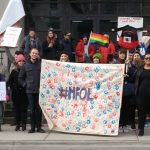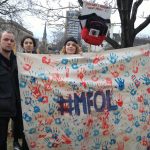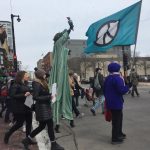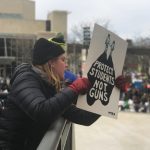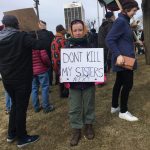On March 24th, students from Professor Cheryl Coan’s Service Learning course, ‘History of Activism,’ as well as a handful of other MIAD students who joined of their own accord, marched in solidarity with students and others across the country.
Cheryl had invited her students to participate in the march, think about it critically, and reflect on their experience. THIS is Service Learning.
The March For Our Lives
As you read this, students around the U.S. are continuing to rally for more effective gun control laws. Many of them are the creators and initiators of the March For Our Lives, which was sparked following the tragedy at Marjory Stoneman Douglas School in Parkland, Florida on Valentine’s Day this year, itself the latest iteration of a decades-long trend of school shootings in America. The march took place on March 24th in cities all over the nation, including here in Milwaukee, Wisconsin, where participants marched from the Milwaukee County Courthouse to City Hall.
MIAD Service Learning students marched together from MIAD to the Courthouse with hand-crafted signs in tow.
- MIAD students prepare to march to the Milwaukee County Courthouse.
- Representing MIAD student voice as the rally began in front of the Courthouse.
- Sometimes we just need to help each other out…
- Lady Liberty. Photo courtesy student, Jocelyn Escobar.
- Protect Students Not Guns. Photo courtesy student, Sidney Ylagan.
- Don’t Kill My Sisters. Photo courtesy student, Hayden Harwood.
What students said about the experience…
“I felt that being involved with the march made the day so much more special, especially knowing that our school was a part of it.”
“One moment, I looked back and the entire street for 8 blocks was filled with marchers. Then coming home and seeing the footage of the multiple marches across the country made me feel that we as a class and individually made our voices heard.”
“It really put into perspective how many people are really in this city and how many of them, from all walks of life, support the same causes that I do.”
The Service Learning – Activism Connection
The history of the pedagogical method of “Service Learning” is tied to the history of activism and social reform in America (Daynes & Longo, 2004). Its rationale is founded in the work of such thinkers as Pragmatist philosopher, John Dewey, early twentieth century peace activist and mother of modern social work, Jane Addams, and Brazilian philosopher Paulo Freire, among others. These individuals, and the movements that followed them, took a broad view of education. Although each of their respective philosophies differed, there were also some components on which they tended to agree. For one, each portrayed learning as experiential. We learn by being active participants in our world and continuously reflecting on our experiences (Deans, 1999). From this, it follows that our learning (and indeed, our institutions of learning), occurs in the context of our culture and our society. Higher education in particular prepares us to contribute to the workforce. Ultimately, however, what is education for, but to nurture the hearts and minds of an engaged citizenry, who will cultivate the best society for all of us?
“…the distance between the university (or what is done in it) and the popular classes should be shortened without losing rigor and seriousness, without neglecting the duty of teaching and researching.” ~ Paulo Freire (Deans, 1999, p.19)
The participation of MIAD’s service learners in the March For Our Lives, as well as the large-scale student engagement in this movement around the nation, is just this.
References:
Daynes, G. & Longo, N. V. (2004). Jane Addams and the Origins of Service-learning Practice in the United States. Michigan Journal of Community Service Learning, 11, 5-13. http://hdl.handle.net/2027/spo.3239521.0011.101
Deans, T. (1999). Service-Learning in Two Keys: Paulo Freire’s Critical Pedagogy in Relation to John Dewey’s Pragmatism. Michigan Journal of Community Service Learning, 6(1), 15-29. http://hdl.handle.net/2027/spo.3239521.0006.102
